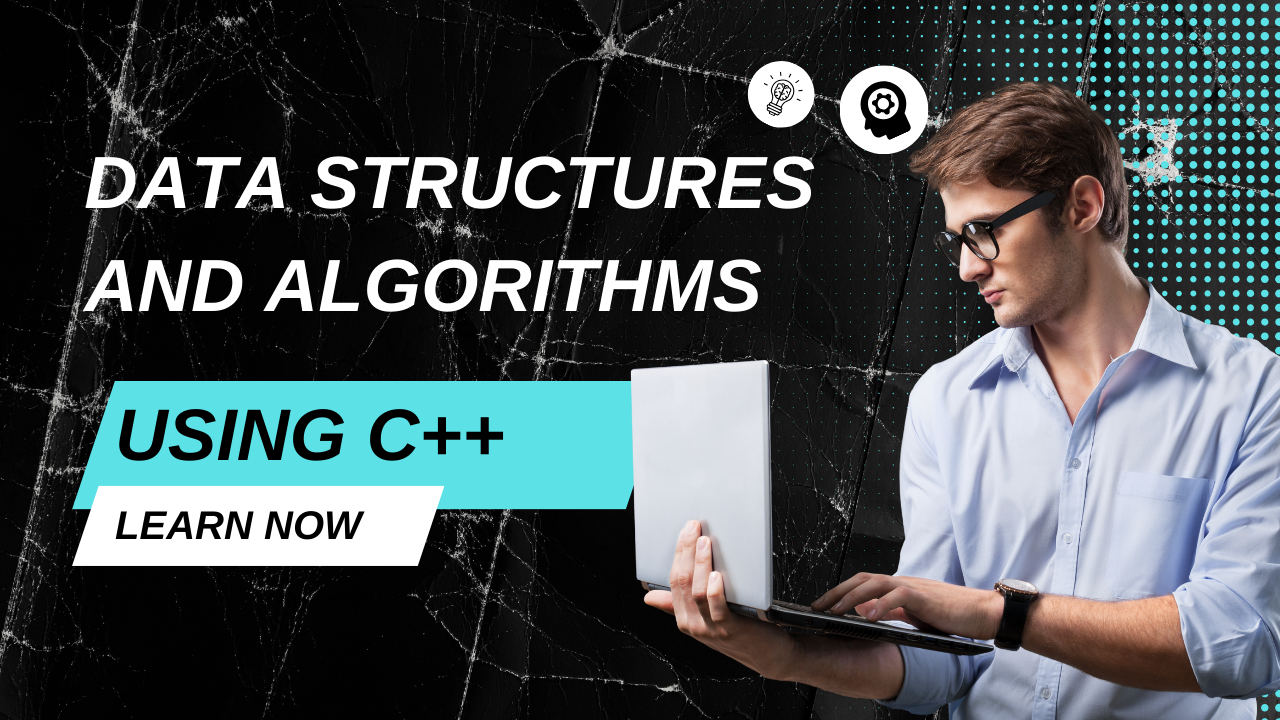Course Details
Data Structures and Algorithms Using C++
IT
Provider Name : GlobalOne Services
Course Type : Hybrid
Duration (Hrs) : 90
Hours/day : 3
Training Type : Hybrid
Certification : yes
Orginal Price : 15000/-
Discount Price : 13500/-
No.of. vacancies : 500
Last date to apply : 2024-12-01
Full Information
Course Description
The DSA Using C++ Course is designed to provide a comprehensive understanding of data structures and algorithms using C++. This course emphasizes core programming concepts, data structure implementations, and efficient algorithmic solutions. From basics like arrays and linked lists to advanced topics like graph algorithms and dynamic programming, this course builds the foundation necessary for problem-solving and competitive coding. Ideal for those looking to strengthen their coding skills, the course prepares students to tackle real-world challenges and excel in technical interviews, software development, and competitive programming.
Topics to be covered
Module 1: Introduction to Data Structures and Algorithms
Overview of DSA and Its Importance in Programming
C++ Essentials for DSA (STL, OOP Basics, Memory Management)
Time Complexity and Space Complexity (Big O Notation)
Understanding Asymptotic Analysis and Code Optimization
Module 2: Arrays and Strings
Array Operations: Insertion, Deletion, Searching, Sorting
Introduction to C++ STL Arrays and Vectors
String Manipulation and Common String Algorithms
Solving Problems Using Arrays and Strings
Module 3: Linked Lists
Singly Linked List, Doubly Linked List, Circular Linked List
Operations on Linked Lists: Insertion, Deletion, Reversal
Implementing Linked Lists and Memory Management
Solving Linked List-Based Problems
Module 4: Stacks and Queues
Stack Implementation Using Arrays and Linked Lists
Queue and Deque: Implementation and Operations
Applications of Stack and Queue (Expression Evaluation, Parenthesis Matching)
Solving Problems with Stack and Queue Data Structures
Module 5: Trees and Binary Trees
Tree Terminologies and Basic Concepts
Binary Tree, Binary Search Tree (BST), AVL Tree
Tree Traversals (Inorder, Preorder, Postorder, Level Order)
Solving Problems Using Trees and Binary Trees
Module 6: Advanced Trees
Balanced Trees (AVL Trees, Red-Black Trees)
Binary Heap and Priority Queue
Trie (Prefix Tree) and Its Applications
Segment Tree, Fenwick Tree for Range Queries
Module 7: Graphs: Graph Representations (Adjacency Matrix, Adjacency List) Depth-First Search (DFS) and Breadth-First Search (BFS) Graph Algorithms: Dijkstra’s, Prim’s, and Kruskal’s Algorithms
Module 8: Hashing and Hash Tables
Introduction to Hashing and Hash Functions
Collision Resolution Techniques (Chaining, Open Addressing)
Implementing Hash Tables in C++
Solving Problems Using Hash Maps
Module 9: Greedy Algorithms and Dynamic Programming
Understanding Greedy Algorithms and When to Use Them
Classic Greedy Problems (Activity Selection, Huffman Coding)
Introduction to Dynamic Programming (DP) Concepts
Solving DP Problems (Knapsack, Longest Common Subsequence, etc.)
Module 10: Divide and Conquer and Recursion
Recursion and Its Applications in Problem-Solving
Divide and Conquer Strategy (Merge Sort, Quick Sort)
Backtracking and Its Applications (N-Queens, Sudoku Solver)
Optimization Techniques and Recursion-to-Iteration Conversion
Module 11: Data Structures and Algorithms in Practice
C++ Standard Template Library (STL) for DSA
Advanced STL Containers (Set, Map, Priority Queue)
Hands-On Practice with Coding Challenges and Problem Sets
Building End-to-End DSA Solutions and Projects
Module 12: Capstone Project
End-to-End DSA Project in C++
Problem Analysis, Solution Design, and Implementation
Optimizing and Debugging Complex DSA Solutions
Presenting and Documenting the Project
Benefits of Course
The DSA Using C++ Course builds a strong foundation in data structures and algorithms, which are crucial for software development and technical interviews. By understanding and implementing complex data structures, students develop essential skills for efficient problem-solving, optimizing code, and understanding computer science fundamentals. This course prepares students for real-world applications, competitive coding, and acing coding interviews. Additionally, knowledge of DSA with C++ enhances adaptability, enabling students to work confidently with other languages and platforms in a variety of technical roles.
Pre-Requirements
None
